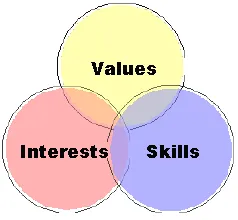
Whether you are a postbac, graduate student, postdoc or clinical fellow, you probably have wondered how to blend your individual interests, values and skills into a satisfying career. Self-assessment is an integral part of an effective career planning process and involves asking yourself about your: Skills -How good am I at different lab techniques or giving talks? -How are my language, mentoring, training, writing and communication skills? Interests -What interests me? For example, do I prefer running the experiment or writing up the experiment? Values -What is important to me in a job? For example, do I need to have a lot of variety or do I prefer to have a pretty consistent schedule? -What do I value? For example, do I value having autonomy and independence or do I value being a member of a team? There are many ways to assess your interests, preferences, values, skills and priorities. Here are a few resources to consider: 1. Career Counseling If you are part of the intramural program at the NIH, schedule an individual meeting with a career counselor in the Office of Intramural Training and Education (OITE) to talk about your career goals and preferences and ways to do some formal self-assessments which will help you develop a plan to reach your goals. Not at the NIH? Check with your institution, graduate program, or postdoc office to see what is available for you. 2. Developing an Individual Development Plan MyIDP.org is a free site designed especially for PhDs and it provides: - Exercises to help you examine your skills, interests, and values - A list of 20 scientific career paths with a prediction of which ones best fit your skills and interests - A tool for setting strategic goals for the coming year, with optional reminders to keep you on track 3. Planning for Career Satisfaction and Success This videocast and materials from this past workshop will help you understand how your personal interests, skills, and values contribute to your future career success. A major theme is taking ownership of your decisions. Important topics include: the importance of career decision making, self-assessment, transferrable skills, networking, defining success, personal needs, work/life balance, and defining short-term and long-term goals. 4. Completing Online Self-Assessment Exercises There are many free self-assessment exercises to help you identify your goals, values, skills and motivations for work. a. The LifeWork Transitions site offers many great activities. Step 3 – Redefining Your Self: Passions, Preferences, Purpose is especially helpful in assessing your life and work values. b. Steward Cooper Coon offers many free online tests, including: Career Values Test Motivated Skills Test 5. Attending the Workplace Dynamics Series The Workplace Dynamics Series offered through OITE is another tool to help you with self-assessment around areas like communications skills, teamwork, conflict and diversity. Self-assessment is not an easy process and it won’t happen overnight. Give yourself the time, space and energy to be introspective. Knowing your skills, values and interests will allow you to be a more effective job searcher because you will have a sense of roles that would or would not be a good “fit” for you. Having a good idea of your own values and interests can help prioritize your professional goals. This focus will allow you to ask better questions during informational interviews and employment interviews alike.




